In the ever-evolving logistics landscape, cargo shipping containers remain a pivotal element, facilitating global trade and supply chain efficiency. According to the World Trade Organization, more than 80% of the world's merchandise trade by volume is transported by sea, with cargo shipping containers playing a crucial role in this process. Innovations within the industry continue to transform the functionality of these containers, leading to creative applications that extend beyond traditional cargo transport. For instance, a report by Market Research Future indicates that the container shipping market is projected to grow at a CAGR of 4.5% through 2025, primarily fueled by advancements in container design and logistics technology. As companies seek to optimize efficiency and sustainability, unique cargo shipping container examples are emerging as a testament to how adaptive strategies can reshape the industry, driving operational improvements and economic benefits.

The logistics industry is witnessing a transformative wave of innovation in cargo shipping container designs that are not only redefining traditional practices but also enhancing sustainability. Among these groundbreaking developments is a French company’s initiative to launch a 100% wind-powered cargo ship. This venture promises to revolutionize maritime transport, drastically reducing carbon emissions associated with conventional shipping methods. By harnessing renewable energy, this innovative design exemplifies how the industry is shifting towards more eco-friendly solutions.
Additionally, the integration of advanced technologies in logistics is reshaping the construction and transportation of goods. For instance, specialized shipping containers are now being used in construction, providing cost-effective and versatile solutions. Furthermore, systems like the Cool Logistics Corridor are being developed to enhance the transport of temperature-sensitive goods, ensuring quality while minimizing waste. These advancements illustrate a clear trend where innovation is not only facilitating operational efficiency but also addressing the critical need for sustainability within the logistics sector.
In recent years, the logistics industry has seen a significant shift towards eco-friendly practices, with sustainable cargo shipping container solutions leading the charge. These innovative containers not only reduce the carbon footprint associated with transportation but also promote recycling and repurposing. Companies are now opting for containers made from sustainable materials, which can be refurbished or recycled after use, contributing positively to the environment.
When considering sustainable shipping practices, adopting certain tips can make a considerable difference. First, prioritize using energy-efficient routes for transportation to minimize fuel consumption. Additionally, consider implementing a system for reusing containers where possible, which can drastically cut down on waste. Finally, embracing technology such as IoT can enhance tracking and efficiency, reducing unnecessary shipments and ultimately lessening environmental impact.
Furthermore, businesses can encourage their partners and customers to engage in eco-friendly shipping practices. This not only fosters a sense of responsibility but also builds a brand image centered around sustainability. Together, these steps can significantly contribute to a greener logistics industry while maintaining efficiency and cost-effectiveness.
The logistics industry is undergoing a significant transformation, primarily driven by the integration of Internet of Things (IoT) technology in high-tech cargo shipping containers. According to a report by Statista, the global IoT in logistics market is projected to reach USD 75 billion by 2025, highlighting the critical role technology plays in optimizing supply chain processes. Smart containers equipped with IoT sensors enable real-time tracking of shipments, temperature control, and security monitoring, which enhances operational efficiency and reduces the risk of cargo loss or damage.
Moreover, a study from McKinsey & Company indicates that implementing IoT solutions can improve logistics productivity by up to 30%. These smart containers are capable of collecting vast amounts of data, allowing companies to analyze operations and make informed decisions swiftly. Real-time insights lead to better route planning, reduced fuel consumption, and timely maintenance of shipping equipment, all of which contribute to a more sustainable logistics model. As the industry pivots towards innovation, it’s evident that high-tech containers are not just a trend; they represent the future of an increasingly connected and efficient logistics ecosystem.
| Container Type | Dimensions (ft) | Weight Capacity (kg) | IoT Features | Temperature Control | Location Tracking |
|---|---|---|---|---|---|
| Standard Dry Container | 20 x 8 x 8.5 | 22000 | Temperature Sensors | No | Yes |
| Reefers Container | 40 x 8 x 9.5 | 30000 | Temperature and Humidity Monitoring | Yes | Yes |
| Flat Rack Container | 20 x 8 x 8.5 | 20000 | Load Sensors | No | Yes |
| ISO Tank Container | 20 x 8 x 8.5 | 26000 | Pressure Sensors | No | Yes |
| High Cube Container | 40 x 8 x 9.5 | 30000 | Vibration Sensors | No | Yes |
The logistics industry is undergoing a significant transformation with the rise of modular container uses that extend beyond traditional shipping methods. According to a 2022 report by the International Maritime Organization, the global container shipping market is projected to grow at a CAGR of 4.2%, emphasizing the increasing importance of innovative container applications. From portable pop-up shops to modular housing solutions, cargo shipping containers are being repurposed in diverse ways, demonstrating their versatility and practicality in various sectors.
One remarkable example is the adaptation of shipping containers into emergency housing units in disaster-stricken areas. A study by the United Nations High Commissioner for Refugees highlighted that utilizing modular containers could reduce housing assembly time by 30%, providing rapid relief in crises. Additionally, companies like Boxhouse have transformed containers into eco-friendly homes, showcasing sustainability while meeting housing demands. These transformations not only address pressing societal issues but also highlight the potential for containers to pave the way for smarter, more sustainable logistics solutions.
The rise of shipping container conversions is reshaping urban development, presenting innovative solutions for housing, retail, and workspace needs in densely populated areas. According to a report by the International Organization for Standardization (ISO), over 200 million shipping containers are in circulation globally, with a significant number going unused. This surplus can be repurposed into functional and stylish spaces that enhance urban landscapes. Notably, container-based projects are often more economical; studies have shown that constructing with shipping containers can reduce building costs by up to 30% compared to traditional methods.
Tip: When considering a shipping container project, ensure that you source containers in good condition. Container integrity is crucial for safety and long-term durability. Additionally, consider local regulations regarding building codes and zoning laws to facilitate a smoother conversion process.
Furthermore, the environmental impact of using recycled containers is significant. The World Economic Forum highlighted that converting shipping containers into livable spaces not only saves on construction materials but also effectively reduces waste, contributing to sustainability efforts. By opting for this model, cities can address housing shortages while promoting eco-friendly practices.
Tip: Collaborate with architects who specialize in container architecture. Their expertise can help maximize the potential of the space while ensuring compliance with safety standards and aesthetic appeal.
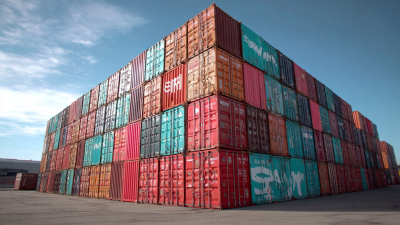
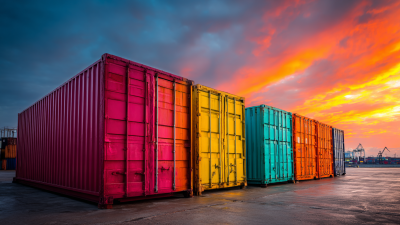
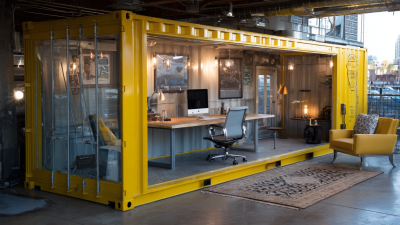
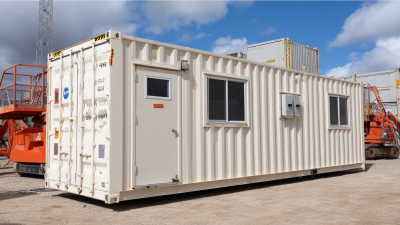
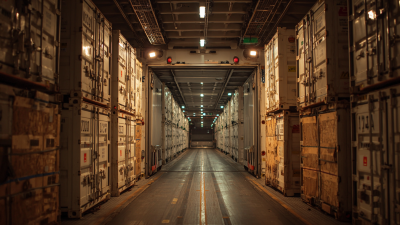

Rob was always very honest and upfront about everything and took the time to explain everything I needed.
“highly recommended. They provided us with a great storage container with ontime services.”
“Bought a used container, its perfect, no leaks and in good condition.”
“Good service and prompt delivery. A great option for temporary storage at a decent price.”
Join our mailing list to get the latest storage container inventory and offers